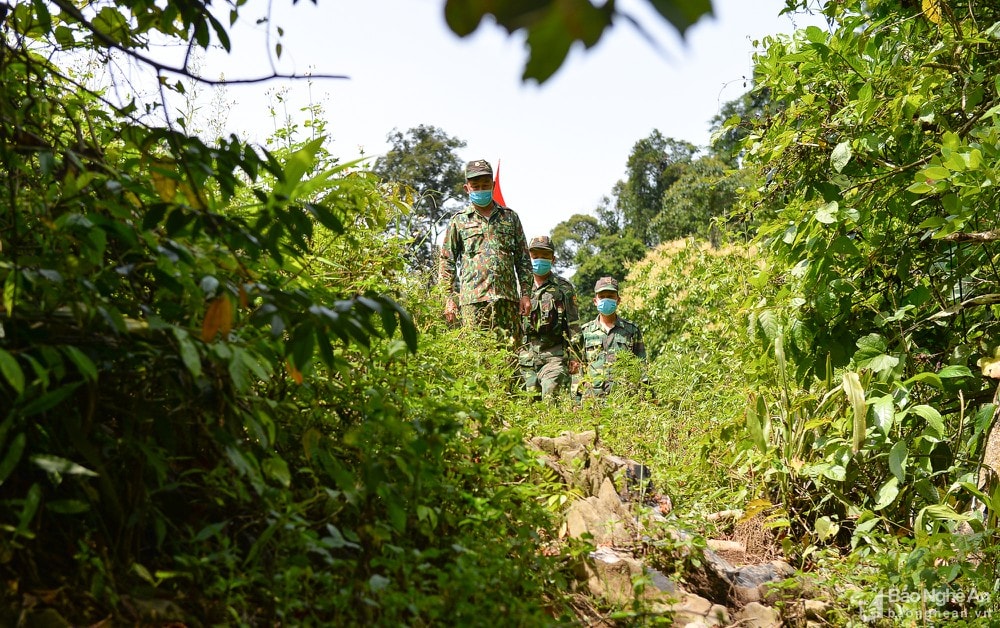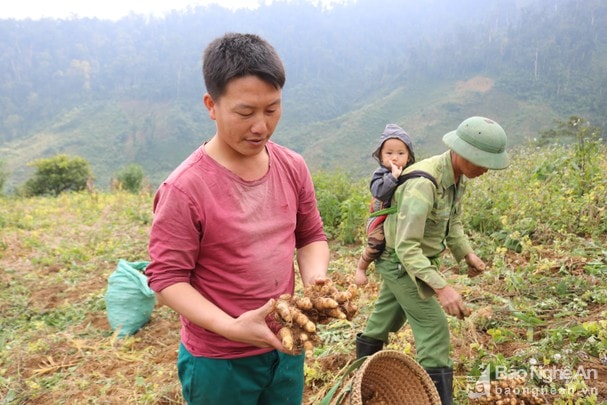Nghe An: Implementing 'four together' and 'three sticking together' with people in border areas to develop the economy
(Baonghean.vn) - The People's Committee of Nghe An province has just approved the Project to improve the effectiveness of supporting households in border areas, contributing to socio-economic development, associated with protecting sovereignty and border security in Nghe An province, period 2020 - 2025 and the following years.
Nghe An is the province with the largest area in the country, with 468,281km of land border and 82km of coastline. The border area (KBBG) of Nghe An province has 61 communes (wards) in 11 districts (towns).is an important location in terms of socio-economics, national defense - security (NDS) and foreign affairs.
Over the past years, the Central Government and Nghe An province have had many policies, programs and projects to take care of investment, construction, support socio-economic development and ensure national defense and security for the border area. Thanks to that, the socio-economic situation in the border area has changed significantly, the material and spiritual life of the people has been increasingly improved, national defense and security, social order and safety have been consolidated and maintained.
In particular, the Border Guard force has regularly advised and closely coordinated with local Party committees and authorities to support and help people develop production according to the motto of "holding hands and showing them how to do things"; well implementing the "four together" (eating together, living together, working together, speaking the ethnic language together), "three sticking together" (sticking to the people; sticking to the area; sticking to policies and guidelines), directly guiding people to develop household economy, eliminate hunger and reduce poverty.
 |
| Nghe An border guards patrol the border. Photo courtesy of Thanh Cuong. |
Many activities to help people by all levels, sectors and the provincial Border Guard force have brought about positive results, contributing to changing the face of the countryside, such as: Helping people build rural roads, irrigation canal systems; reclaiming and restoring new areas for agricultural, forestry, salt and fishery development; repairing schools and classrooms; eliminating temporary houses for the poor, lonely elderly and disabled people; supporting rice to relieve hunger for poor, near-poor, especially disadvantaged and hungry households during the lean season; supporting plant and animal varieties for people to develop production; advising people to borrow capital with low interest rates to develop household economy...
In addition, many volunteer activities towards the border, helping the poor, notably the programs "Border shelter"; "Warm winter clothes"; "Border spring warms the hearts of the villagers"... have made an important contribution in helping ethnic people in the border area to eliminate hunger, reduce poverty, and improve their lives.
However, the socio-economic situation in the border areas, especially on the land border, is still slow to develop.
In the coming years, the political security situation, social order and safety in the province, especially the border area, still have many complicated problems. In addition, in the coming time, Laos will return a large number of Nghe An citizens (mainly Mong people residing illegally) to the border area, requiring all levels and sectors to have policies and solutions to help people stabilize their lives, develop the economy, eliminate hunger, reduce poverty, and end illegal migration.
At sea, the situation of sovereignty and sovereign rights violations is unpredictable.
Therefore, the issuance of the Project "Improving the effectiveness of supporting households in border areas, contributing to socio-economic development, associated with protecting sovereignty and border security in Nghe An province, period 2020 - 2025 and the following years" is very necessary.
The objective of the Project is: 100% of households in the border area are informed, disseminated, and understand the basic contents of ethnic, religious, hunger eradication and poverty reduction policies; citizens' rights and obligations regarding personal status, protection of territorial sovereignty, border and island security, and crime prevention and control; and minimize illegal migration.
100% of Border Guard stations have effective models to help people develop household economy to replicate in the area. Strive to contribute to reducing the poverty rate in the border areas of the province by over 3% each year. Strengthen management, education, and reform of people with complicated political and social relationships and law violators. Strive to have no hot spots in the border areas.
By the end of 2025, people in the border area will have positive changes in awareness; receive advice, support, and help to improve their living standards.
Solutions for implementation include: Strengthening the dissemination of the Party's guidelines and policies, the State's policies and laws; Strengthening and building a strong grassroots political system; Promoting border-oriented activities; building a peaceful, friendly, cooperative and developing border; Improving the effectiveness of hunger eradication and poverty reduction.
In particular, the functional sector will coordinate to review and make a list of poor and near-poor households to mobilize loans for production and livestock development.
 |
| Enterprises in Nghe An invest in growing ginger for export in Ky Son. Photo: Lu Phu |
Build and replicate models of household economic development. Organize training and guidance on cultivation and livestock techniques; apply scientific advances; introduce plant and animal varieties into production and livestock development suitable to the land, soil, climate and weather conditions of each locality.
Mobilizing businesses to invest in the border area, both exploiting the potential and advantages of land and labor, and contributing to creating jobs for the people.
Provide direct support for seeds, plants and animals to poor and near-poor households, helping people implement economic development models.
Improve the quality of military and civilian medical network activities associated with health care, disease prevention, population communication...
The Provincial People's Committee assigns specific responsibilities to the sectors and assigns the Department of Finance to annually coordinate with the Provincial Border Guard Command to advise the Provincial People's Committee to support funding for the implementation of the Project.
Coordinate with sectors in charge of programs and projects to guide districts (towns), communes (wards) and households participating in the project to manage and use supported funds in accordance with current regulations.
